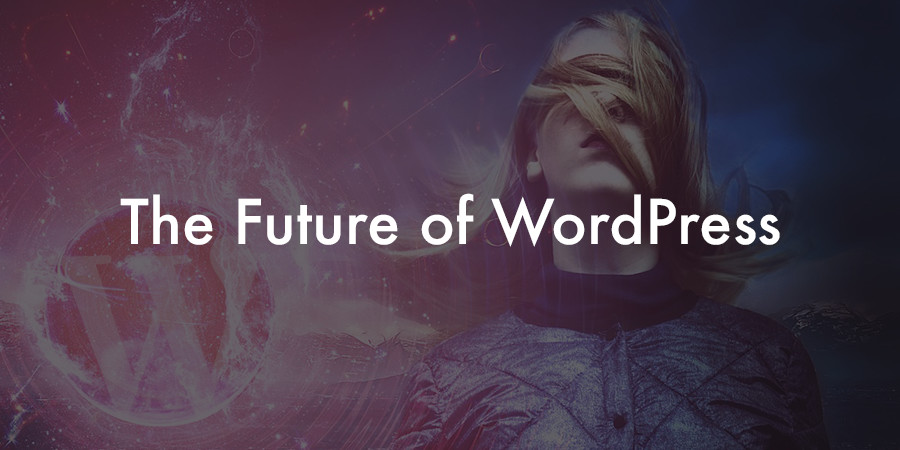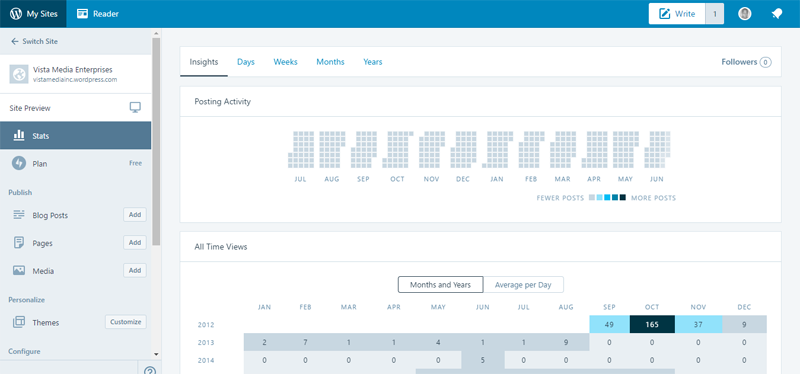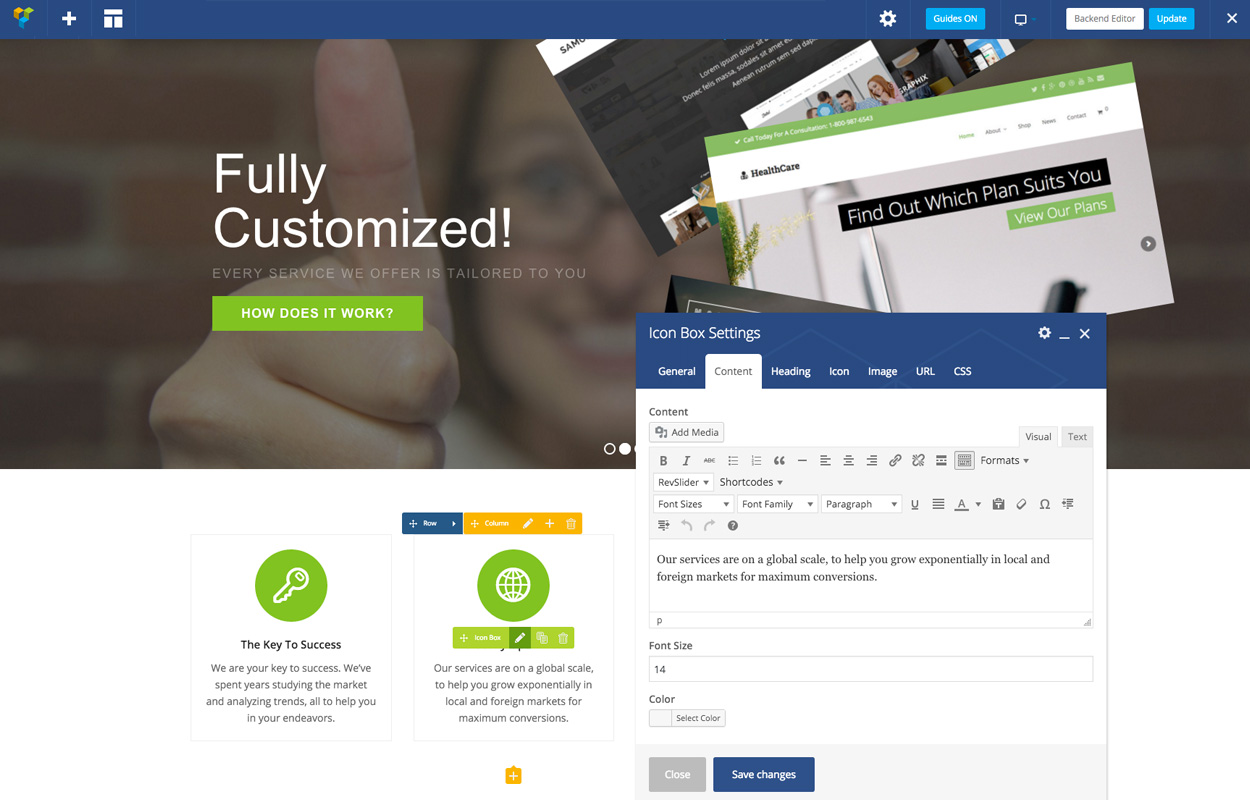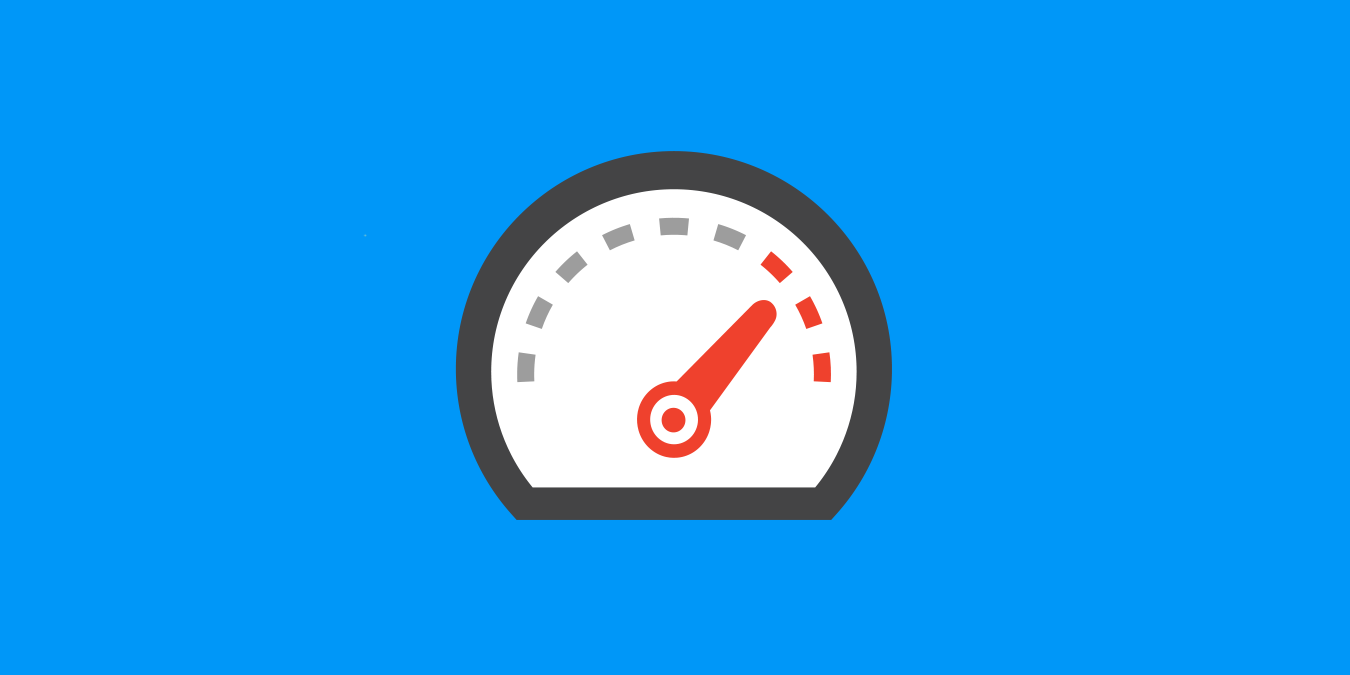What Will The Future of WordPress Look Like?

The future of WordPress is bright like a thousand suns for lack of a better simile. Once a run of the mill blogging platform, WordPress is effectively morphing into an application framework that’s riling pundits and newcomers all over the web.
A while ago, we outlined how WordPress came to be and how it grew into a content management system (CMS) that powers over 75 million websites, including big name brands such as CNN, Jay-Z and so much more.
At the time of writing, WordPress is quite the robust platform what with the arrival of new technologies that, let’s face it, appear to come from Sci-Fi movies. If you’re wondering, we drop a couple of terms that might fry your brains, but please don’t run away.
Instead, stick around because what we’ve lined up today means all kinds of great things for your WordPress-based business. If you look around, you are bound to find heated discussions about beasts such as WordPress Rest API, WP-CLI, Calypso and backwards compatibility among others.
The Future of WordPress Beyond 2017
Well, these are the kind of things that make sense only to developers. Heck, subjects like WordPress REST API confuse the crap out of many developers as well, so we will spare you that kind of torture. What we share today is how said technologies can help you achieve more with WordPress.
This premise opens the gates to a future of WordPress never seen before. Now, please take my hand and let us call upon Ahn Wee, the hipster Chinese clairvoyant who lives inside every crystal ball. Jokes aside, let’s get this over and done with.
1. Improvements to the WordPress Admin UI
Not so long ago, the WordPress admin was an eyesore. This we know firsthand because we hopped on the damn time machine and discovered how the WordPress admin UI has evolved. And while the user interface (UI) has nothing on a tool such as Ghost, it’s much improved.
But what does the future of WordPress have in store for us in terms of the admin UI? You guessed right if you expect the WordPress admin to change for the better. If Calypso isn’t evidence enough, I don’t know what is.
My Jamaican friends would be like, “The hell is Calypso man?” If you haven’t visited WordPress.com in a while, you’re missing out on the all new Calypso interface. Don’t own a WordPress.com blog? Well, Calypso gave WordPress.com blogs an extreme makeover in terms of admin UI.

It’s beautiful and super-fast to say the least (back at your Ghost), and you can easily and freely use Calypso to manage your self-hosted blogs from one central location. The only requirement is you must activate Jetpack and the WordPress.com desktop app. Then again, you can manage your self-hosted sites from your WordPress.com account.
With Matt angling for a more user friendly experience, Calypso is likely to cross over to self-hosted WordPress in the future. This, or the WordPress design team will come up with a better UI, but why reinvent the wheel when you already have American Racing?
In any case, expect an improved WordPress admin that’s cooler and faster than what we have at the moment. This can only mean great things for your WordPress business simply because speed is good. There is also a distinct possibility of seeing custom dashboards thanks to the REST API.
2. WordPress as an Application Framework

I believe quite strongly that JavaScript and API-driven interfaces are the future of not just WordPress but the web. – Matt Mullenweg
This, Matt said at State of the Word back in 2015. Today it is very much a reality, more so with the REST API being merged into WordPress core. What is it with these tough words hombre? What’s REST API? And how, pray tell, is it important?
Well, in its most basic form the REST API is simply code that allows you to send and retrieve data from WordPress regardless of the application you have. This means you can use WordPress as a framework to manage content for any web application out there.
Say hello to all kind of great possibilities for the WordPress developer of the future. You can build mobile apps on WordPress just as easily as you build websites. You can have native iPhone or Android apps running on WordPress because – REST API.
If you had no idea, that Calypso animal we just mentioned is simply a custom interface that communicates with WordPress via – wait for it – the REST API!
3. Cross-Platform Compatibility

This also means you can create highly customized WordPress themes and so much more. Simply put, the REST API brings a lot of possibilities to the table, which means the future of WordPress became even brighter. Imagine building apps in whichever programming language and using the powerful WordPress backend to drive everything. It does sound great, right?
The only drawback is, as a WordPress developer, you must up your JavaScript skills to take full advantage of REST API. Yes, WordPress will still run on PHP in the future, but much of front-end development will depend on JavaScript.
Guys, WordPress is no longer just a CMS, it is now a full application framework that can do virtually everything. Matt, in a Reddit AMA, said:
I think it (WordPress) is a great framework for anything content-driven. For things like messaging that don’t map well to WP’s data model, you can still do it just make some new tables, don’t try to shoehorn it in the standard ones.
At the end of the day, the REST API is an amazing addition to the WordPress core that means you’re not going anywhere soon.
Moving on swiftly…
4. A Bigger Piece of the User Base Pie

WordPress powers a gargantuan amount of websites. It’s the most popular application framework (yes, this sounds better than CMS) from here to Mars and beyond. Many other solutions will need decades of development just to catch up.
And with all these new updates dropping all the time, you can expect more and more people to jump on the WordPress bandwagon. Of course, the future of WordPress means a more beginner-friendly platform that woos everybody across the board. The result? More beginners join.
Beginners won’t split hair on boarding and developers across the web will no longer think WordPress is just a blogging platform. Thanks to the REST API, all developers will know the unbridled power of WordPress is at their beck and call whenever. The result? Developers from all walks of life join.
Speculation by them experts has it WordPress will power over 35% of the web by the year 2020. That’s a huge figure considering WordPress already runs 1 out of 5 websites in 2017. Do you need us to tell you what a user base of this proportion means for your WordPress-related business?
If you need us to hold your hands in regards to this, it means plenty of business opportunities, a bigger and better community and so much more. The community is one of WordPress’ strong suits, and the driving force behind most (if not all) WordPress products.
The huge market size and the development community around WordPress are two reasons why it is great to base your business around WordPress. – Muhammad Haris
5. Front-End Content Design

With the advent and popularity of WordPress page builders such as Beaver Builder, Visual Composer and these site building tools (via Website Builder Insider), it is evident there’s a faction of WordPress users who are into front-end content design. The trend has migrated to WordPress themes with the best shipping with full-blown page builders.
Now, you needn’t know a line of code to whip up beautiful designs like a boss. What does this say about the future of WordPress? We can expect to see more front-end builders enter the market. These could be standalone plugins or builders that are integrated in themes.
That aside, it’s challenging to design pages inside the native WordPress editor. This doesn’t change whether you use the visual editor or toggle to the text editor, with the latter demanding some coding skills. With how things look and to keep most beginners sane, WordPress might ship with an in-built page builder in the future.
Well, it wouldn’t break a bone to create amazing pages right from within WordPress. And as more developers adapt the REST API and become aware of all the awesome things JavaScript means for the front-end, much of design work will shift from the backend.
This means you won’t spend hours on top of hours training clients how to change a font here and some color there. It’s all good as long as we adhere to the best standards and make code bloat a thing of the past. Drag and drop content creation isn’t a fad, it is here to stay.
6. Focus on Mobile Responsiveness & Performance

When asked about the biggest challenge facing WordPress, Matt said making WordPress more mobile friendly is of utmost importance. His exact words were:
I think mobile is very challenging because it’s fundamentally on closed platforms.
Responsive and mobile-first web design was unheard of a couple of years ago. In a world where the majority of people surf on mobile devices, you cannot afford to run a rigid site. Yet, there are businesses with websites that are as rigid as rigid gets.
WordPress developers churn out responsive products nowadays and the results are impressive. Accessing the WordPress admin from a mobile phone is not exactly smooth. There’s so little you can do on a mobile device.
More work is needed in this area, and the more responsive WordPress becomes (especially in the areas that really matter), the higher the adoption rate among mobile users. We can expect WordPress to become more responsive in the future.
7. Performance

On matters performance, the WordPress team has a keen focus on stability, usability and speed. Or as Matt puts it:
First and foremost the most important things for a platform are stability, speed, and security. To do those well you need the ability to push updates and fixes as close to real-time as possible. And it needs to work in every language. User authentication, data and caching abstraction.
He has some advice for aspiring theme and plugin developers as well:
Design and usability are more important than ever. Watch a friend or family member try to use your plugin from start to finish, and it’ll give you a ton of ideas on how to make it better.
Further, WordPress utilizes plugin-driven development in the sense that new features are trialed as plugins first to gather feedback from users. This provides plenty of room for performance upgrades that mean only great things for the future of WordPress.
When all is said and done, WordPress primary focus is to make the platform useful to the average Joe, while offering power users the tools they require to bend the framework however they desire. It’s tough, so please make your contribution already.
8. WordPress Will Support More Languages

WordPress polyglots work hard to translate the platform into as many languages as possible and this continues in the future. More themes and plugins become translation-ready in the future of WordPress that Ahn Wee sees 🙂
If you’d love to use WordPress in your own language, this could be your chance to create the WordPress you will be proud to show your kids. We’ve covered WordPress translation in how to contribute to WordPress, so don’t hold back.
9. More Accessibility

We cannot leave out our sensory impaired brothers and sisters since they make up the future of WordPress too. Thanks to API-driven interfaces, developers have more freedom to create a WordPress that works for users “…with sensory impairments, with the option to turn specific accessibility features on and off using JavaScript” – wpmudev.
WordPress has released it’s own Accessibility Handbook but there are hundreds of other open source resources for developers on the web (like the free WP Accessibility plugin). With these tools developers can hone their products to be sure their themes and plugins are usable by everyone. A great example if the Total WordPress theme, which integrates new accessibility features with each update (one of the main reasons why the University of Hawaii chooses to use Total).
What Would WordPress Users Like to See in Future Versions?
We looked around and found some interesting conversations around the future of WordPress. Every user we came across is quite optimistic about the future of WordPress. Here are a couple:
I think that wordpress is awesome but what is needed to ensure survivability is an inbuilt design editor similar to some of the plugins – like vc – to become part of the platform. The wix/ss wagon is a highly profitable business and wp threatens their core existence. – raybees
Then we have…
Much better user experience, primarily for the beginners along with much better interoperability between plugins/themes/WordPress itself so we don’t experience frequent sites’ stoppages after sites’ updates. – Ivica Delic
And finally…
WordPress development skills is quickly becoming one of those skills in high demand, not only from customers, but also from prospective employers. More and more, people are seeing the great opportunity in using WordPress as a true content management system. – Ed Nailor
On The Future of WordPress, Matt Says:
You know, the thing I keep coming back to, and it’s a little cheesy and a little abstract, but WordPress really can be an operating system, for not just the web, but the open web. One of the things that I love about as we grow, and as we become more successful, and gain more of that market share, is that we shift the web to be more open, just by dint of the things built into WordPress. The APIs, the way we do everything, feeds. – Matt, WCEU, 2016
Something to Keep in Mind
Just throwing this out there…
While researching this post, I realized there is so much to learn about how WordPress works. This means I need to brush up on my coding skills, and I advise you to do the same if you’d like to delve deeper into WordPress.
If you haven’t already, learn basic HTML and CSS. On top of that, find a JavaScript course and school yourself up. Hey, don’t forget about PHP as well, because that’s what drives WordPress. If you just need a WordPress theme to setup a business website, we recommend our very own Total WordPress theme.
Over To You…
These are just my 2 cents. We would love to hear your thoughts about the future of WordPress. Where do you see WordPress in the next 5 years? Even better, what would you love to see in the next version of WordPress?




Very nice article Freddy ! According to me, it’s important for WordPress to improve the way it manages the translation because WPML is a mess and I dream to see translation as a native function of WP.
Thank you eddycitrus for the compliment, we take plenty of pride in our work hehe. Great comment too, which also means the end of “This WordPress theme is WPML and RTL ready” kind of offers. Instead WordPress would manage the translation innately and developers (as well as other WP users) can concentrate on the stuff that matters: building a better business for a global audience. Great insights Eddy (if I may call you by that), it’s a pleasure reading your expectations.
Great article Freddy, thanks for sharing these useful insights about WordPress future. In my opinion, changes should be made not by WordPress creators but by WordPress theme developers. We’ve written an article covering this topic as well and would love to have your feedback 🙂